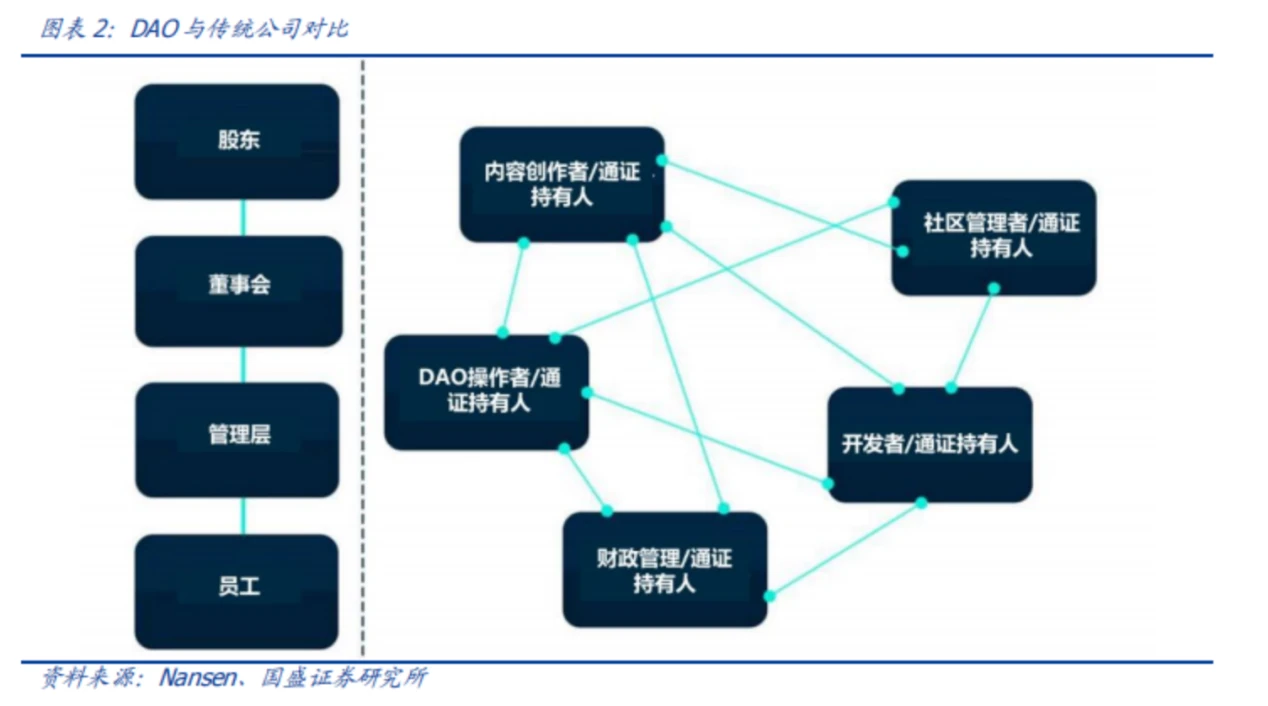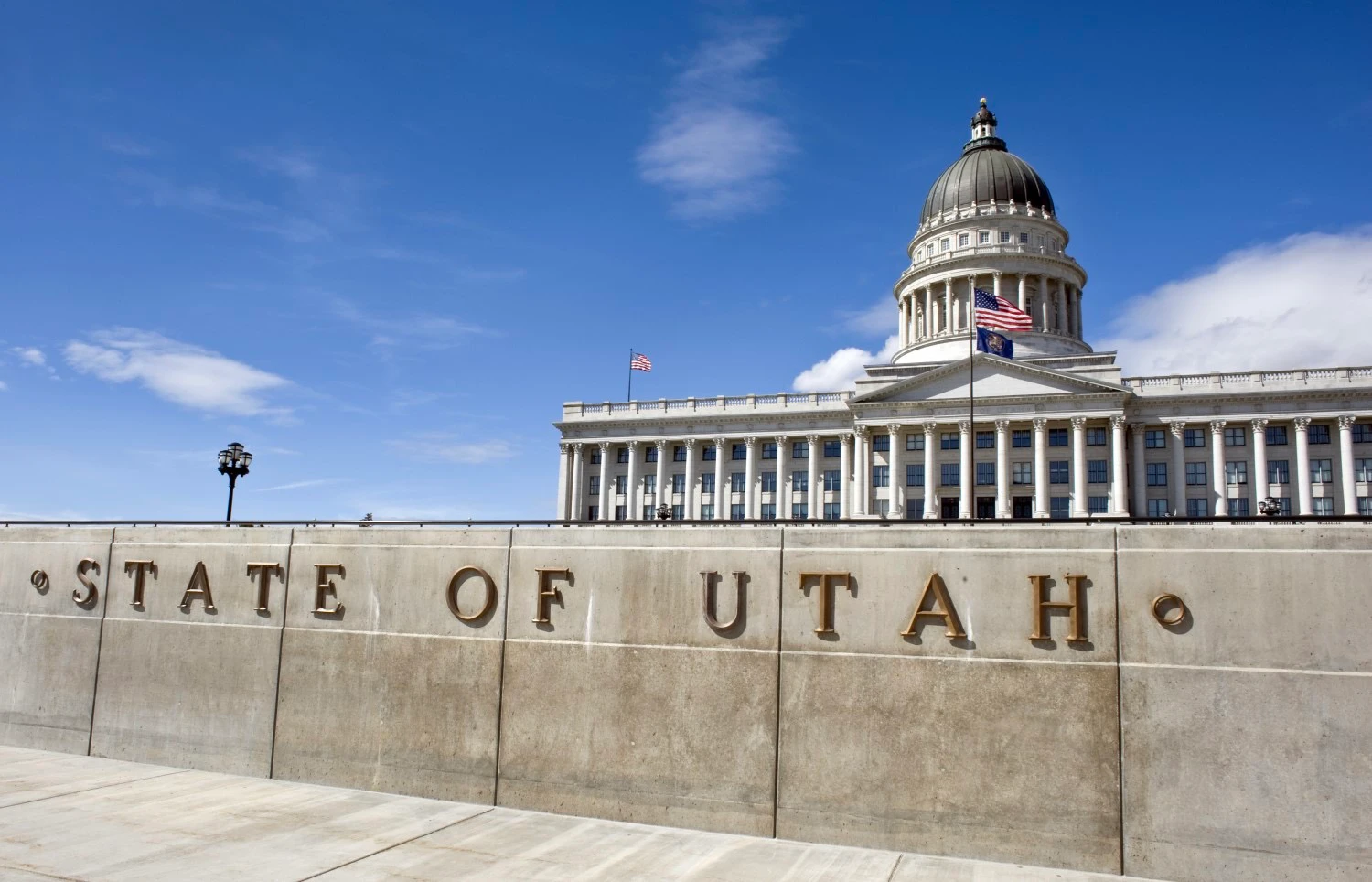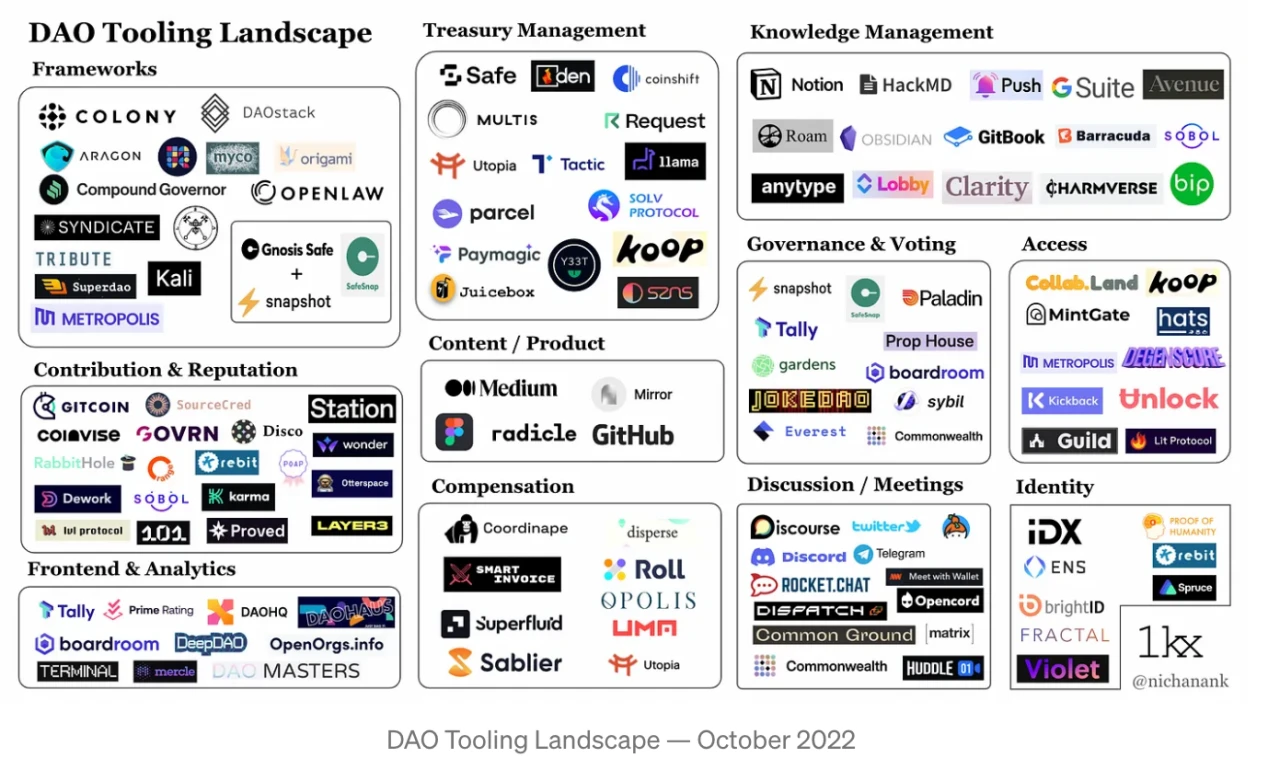How the Rise of Legal Status Leads DAOs Out of the Utopian Dilemma
Author: zf857.eth, R3PO
DAO (Decentralized Autonomous Organization) is a decentralized governance structure or organizational form. Traditional organizations have a top-down hierarchical structure where goals and tasks are delegated downwards, and members complete tasks to receive rewards, resembling a pyramid model. In contrast, a DAO is a group of people who come together due to shared consensus, participating in governance through proposals, voting, and rewards, emphasizing fair distribution of benefits and an environment where there is no power center, allowing all members to exercise power equally.

Before 2021, DAOs Had No Clear Legal Entity
Before 2021, DAO organizations had few good options or space to establish a legal company. Some states or countries allowed DAOs to register as legal entities but required excessive compromises. For example, they would require DAOs to maintain a list of members' full names and addresses, elect a board or trustee with power over the organization, and keep written records of meeting decisions.
First, we must understand that in the United States, if an organization is not registered as a legal entity, it will essentially not be recognized by the government. Most of the modern economy relies on organizations obtaining legal status. For a traditional company or organization, regardless of size or whether it is for profit or non-profit, the first thing to do is to create a legal entity for that organization, typically in the form of a corporation, foundation, or limited liability company (LLC). This raises the question: if a group of people engages in a joint venture without a legal entity, U.S. law treats them as a general partnership. What problems exist for a DAO treated as a general partnership?
In a general partnership, individual participants are each responsible for the actions of the organization and other participants. Therefore, when a DAO experiences fraud, hacking, or accidents, innocent participants are easily implicated.
Legally, general partnerships do not have legal personhood. When most DAOs want to at least have their own logo and trademark intellectual property, this means they cannot sign contracts to do things like open bank accounts, purchase and own property, sue and be sued, or hire employees.
Tax issues arise when general partnerships make money; individuals participating in the organization must pay personal taxes on those earnings. If you own 10% of a general partnership, you must pay taxes on 10% of the organization's profits. The same applies to DAOs.
After 2021, DAOs Were Incorporated into the LLC Framework
On April 21, 2021, the Governor of Wyoming signed Bill 38, focusing on DAOs, making Wyoming the first state in history to recognize DAOs as limited liability companies (effective July 1, 2021).
In February 2022, the Republic of the Marshall Islands passed the "2022 DAO Act," which allows DAOs to be established as limited liability companies (LLCs), enabling them to be recognized as DAO LLCs. The act also prepares to allow both for-profit and non-profit DAOs to register while providing definitions and regulations for the formation of DAOs, agreements, and the use of smart contracts. It enables legally registered entities in the country to formally adopt DAO structures and governance tools.
On April 6, 2022, Tennessee also passed legislation recognizing and allowing LLCs to register as "DAOs," striving to make "Tennessee the Delaware of DAOs." According to state representative Jason Powell, "With this new business structure, Tennessee will become a beacon for blockchain investment and new jobs… just as Delaware became the center for traditional LLCs or South Dakota for credit card companies."
Thus, since 2021, DAO organizations have been incorporated into the LLC framework, allowing them to engage with authorities and the legal system. Wyoming, Tennessee, and the Republic of the Marshall Islands have passed bills allowing DAO LLCs, which are highly flexible and powerful legal entities tailored for DAOs, with all the benefits of traditional LLCs.
Additionally, some DAO organizations may also take the form of Colorado Limited Cooperative Associations (LCA) and Unincorporated Nonprofit Associations (UNA), or choose to establish foundations in Switzerland, the Cayman Islands, or the British Virgin Islands. Since 2021, hundreds of DAOs have been established in these jurisdictions, enabling them to access banking services and protecting their members from personal liability, even ensuring that DAOs can address their tax issues.
However, this form of DAO is not pure; regardless of which form is adopted, it essentially wraps a layer of existing legal entities around the DAO. In other words, in the past, there was no legal concept of a DAO; it is an LLC, a corporation, a cooperative, a foundation, or a trust, but it chose the organizational form of a DAO to operate.
In 2023, DAOs Were Granted Independent Legal Entity Status

On March 1 of this year, Utah passed its DAO bill, recognizing decentralized autonomous organizations as legal entities. All blockchain-native organizations referred to as DAOs will no longer need to wrap themselves in existing corporate structures to benefit from legal personhood. The Utah DAO bill grants legal recognition and limited liability protection to DAO organizations, addressing the limitations of the previous "LLC wrapping" approach.
This means that DAOs no longer need to be packaged as a variant entity of a limited liability company; the DAO organizational form itself has become an independent legal entity recognized by Utah law. According to R3PO research, the following points in the bill are noteworthy:
DAO organizations have legal personhood, but the liability of the DAO is limited to the DAO's total assets. Individual members do not bear liability, except in special cases where liability is divided based on voting power.
A clear and more nuanced tax treatment consistent with current DAO functions has been created. New tax language has been proposed. The tax complexities of DAOs are addressed (Section 48-5-406 (1) of the bill states that if a decentralized autonomous organization recognized by this law qualifies to elect to be classified as a corporation for federal tax purposes, and the decentralized autonomous organization makes that election, it shall comply with the provisions of "Corporate Franchise and Income Tax Act" Chapter 59, Section 7. (2) (a) Unless the decentralized autonomous organization makes the election described in subsection (1), a decentralized autonomous organization recognized by this law shall be classified as a partnership for tax purposes and shall be subject to the provisions of the "Pass-Through Entities and Pass-Through Entity Taxpayer Act" Chapter 59, Section 10, Section 14. (b) For tax purposes, the decentralized autonomous organization shall allocate the share of income, gains, losses, deductions, and credits generated by the activities of the decentralized autonomous organization to each member of the decentralized autonomous organization in proportion to their membership interest in the entity.)
It is stipulated that DAO participants have no implied fiduciary duties unless such duties are explicitly stated as applicable.
"Rules" (rather than operating agreements) are used to protect the anonymity of DAO ownership/participants and provide safeguards.
Technical oversight functions have been incorporated to ensure that a DAO is indeed a DAO.
DAOs have no managers; all members are considered co-managers. All governance token holders will be regarded as DAO members (with regulations on the division of rules).
In summary, Utah has proposed a more refined and targeted compliance framework; LLCs are not DAOs, and DAOs are not LLCs. The Utah bill clearly defines the distinction between the two, meaning DAO participants have more clarity and protection to experiment and innovate. The effective date of the bill is set for 2024. According to the Utah legislature: We made such a compromise to give ourselves another year to edit, adjust, and ensure that the actual implementation of the bill can proceed smoothly.
Where Is the Next Step for DAOs?
Will the formal incorporation of DAOs into the legal system cause them to lose their "decentralization"?
A common concern among many DAO organizations considering forming a company is whether legal compliance will make their DAOs less decentralized, thus contradicting the core values of Web3. However, in reality, the lack of legal compliance often allows people to misuse "decentralization," turning DAOs into tools for wrongdoing.
At the end of last year, in the CFTC lawsuit against Ooki DAO, bZeroX transferred control of the bZx protocol (now the Ooki protocol) to bZx DAO (now Ooki DAO) in an attempt to avoid enforcement due to its decentralized nature. The founder of bZx tried to use the decentralized characteristics of the DAO to evade legal sanctions.
The spirit of "decentralization" is always upheld by the WEB3.0 community, but one should never underestimate the potential for human malice. The passage of the Utah DAO bill grants DAOs formal legal entity status, and while regulating them, it also protects the members of DAO organizations.
It is worth noting that many details in the new bill reflect respect for "decentralization," imposing no excessive restrictions on the internal coordination and decision-making mechanisms of DAO organizations. This undoubtedly demonstrates a commendable attitude towards new things, embracing innovation while rejecting unregulated growth.
The Revival of DAOs Is Imminent
The past year—from Celsius Network to the FTX collapse—has sounded the alarm, highlighting the necessity of decentralizing assets and decision-making, which will inevitably lead to the revival of DAOs. With the continuous innovation of blockchain technology, DAO tools will make future applications of DAOs more streamlined and efficient.
For example, governance, proposals, and voting are essential components of DAOs, with nearly a million active voters and proposers; you need suitable tools to ensure fairness and efficiency. Additionally, the DAO treasury is the lifeblood of every DAO, providing the fuel needed to achieve its goals. Therefore, to ensure effective and secure management, you must use high-quality tools to prevent hacks and errors—especially when interacting with DeFi protocols.

In the near future, participating in a DAO may be as smooth and frictionless as interacting on social media. However, one of the prerequisites for reaching this next level is the necessary integration with the existing legal system. On the other hand, the continuous innovation and advancement of DAO technology will also propel DAOs to mature and integrate with other parts of the global production economy.
Legislative compliance is the foundation and soil for DAOs to establish themselves in reality, while technological breakthroughs serve as nourishment. As DAO legislation continues to improve, achieving true legal compliance will clarify the rights and responsibilities of DAO participants and provide clear tax regulations, gradually alleviating concerns about the practical operation of DAO structures in real life. This will lead to more people potentially adopting the DAO organizational form as a company structure in the foreseeable future, making the revival of DAOs no longer just a fleeting illusion or empty talk.
































